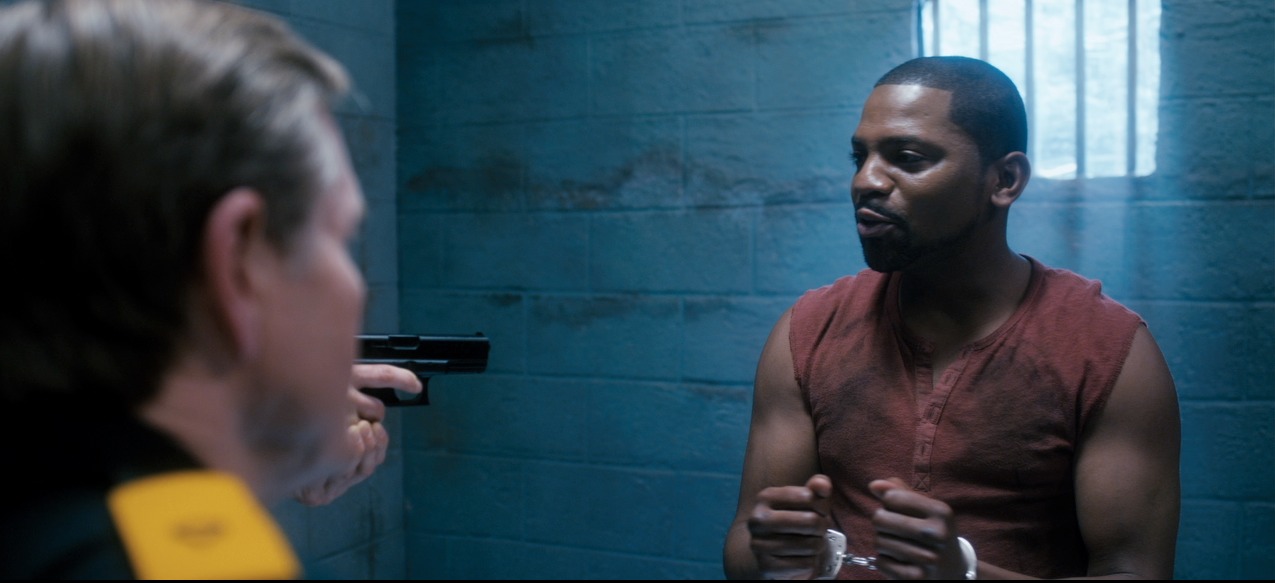
I've just finished shooting my first feature film, called The Suspect. It's a psychological thriller designed to entertain the audience and keep them guessing, but -- and this is truly painful to contemplate -- I fully understand that the film owes its very existence to the ongoing problem of race relations in America. Racial tension is plot, is character, is environment in The Suspect.
Like Quentin Tarantino's D'Jango Unchained, my film comes at the expense -- on the backs -- of so many human beings who suffered under the cruelty of institutionalized slavery and its long echoing shadow, American-style racism.

William Sadler and Mekhi Phifer face-off in Stuart Connelly's The Suspect
The fact makes me feel a bit conflicted, though this conflict is nothing new, of course; tragedy of all sorts has always been the raw material for drama. This is the unrelenting truth for any artist. Still, of all the absurd things to tear at the fabric of society... The color of someone's skin? That pathetic reptile-brain idea is our undoing? This embarrassment is the central irony that circumscribes the problem. Those who are fundamentally opposed to racism don't want to dignify any aspect of it with discussion. So no one ends up talking about the realities of racial conflict, and in not talking we somehow feel the wounds will simply heal themselves. The fact of the matter is different: those wounds fester, and infection spreads.
For my part, I've always felt that each and every conversation about race, no matter how painful or awkward, is a stepping stone toward some better understanding and a solution to the primal problem. Yes, it is a sensitive subject. Yes, we tend to get awfully quiet around it for fear of saying the wrong thing. But conversation, like therapy, is its own sort of "talking cure." I for one want to talk it out-The Suspect is a natural extension of that drive.
Before I was given the wonderful honor of working with Dr. Clarence B. Jones on his memoir of the 1963 March on Washington, Behind The Dream: The Making of the Speech that Transformed a Nation, I wrote a screenplay that covered his entire life story. Now, Clarence was born in 1930, so I struggled with the shifting language of the black/white issue decade by decade-finding the right phrase in the spectrum from "casual" racism to vehement hatred for the 30s, the 40s, the 50s and so on. The sheer breadth of the language was shocking. Every time I typed one of those words, I felt some kind of guilt by association.
I wanted to apologize to Clarence when I handed over my draft. "This isn't me," I wanted to say. I wanted to tell him I was sorry on behalf of all white people. But ever-so-slowly I realized my hesitation was meaningless. Clarence had heard all those words before. He'd lived through my script for real. And nothing this writer-who was only trying to put his experience into a thematic context-could say would offend him in the slightest. He understood my intentions. In that light, those words that littered my script lost all their power to intimidate and debase and scar.
In honor of Black History Month, I've made my "e"-ssay on my experience working with Dr. Jones available as a free download at Amazon below. I hope you'll take a look at it. And if you're so inspired, do continue the conversation...